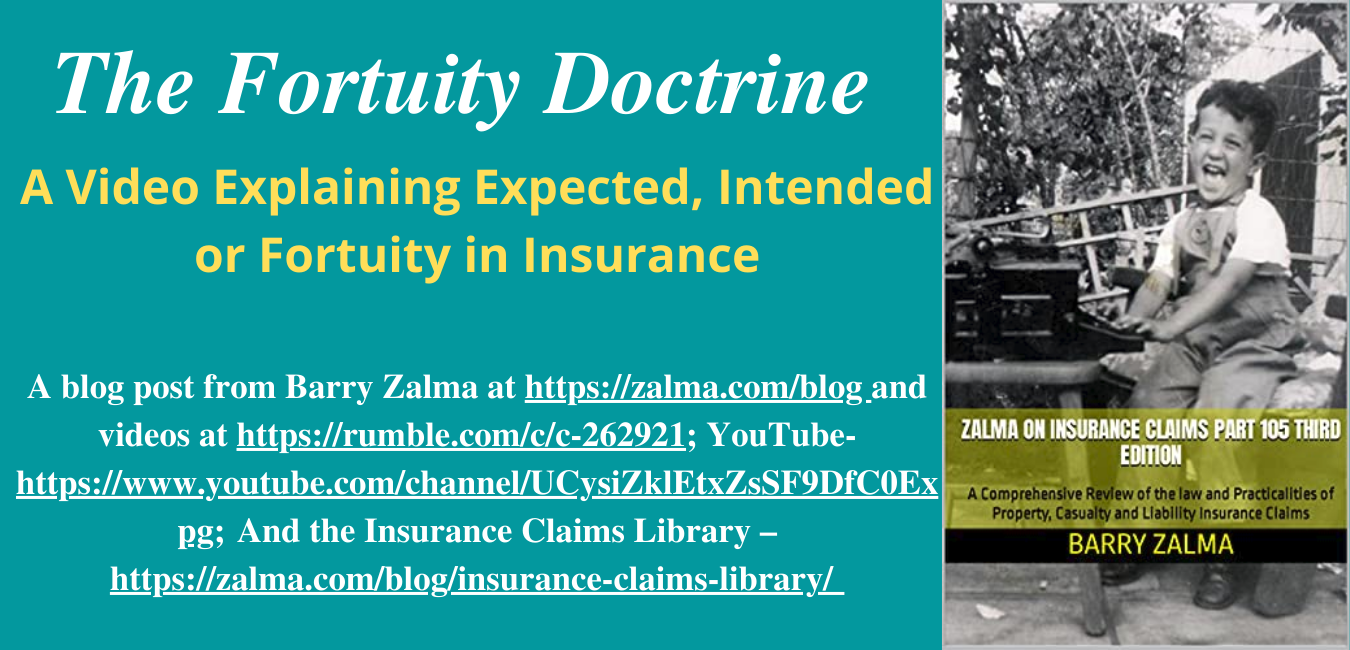-
News Feed
- EXPLORE
-
Pages
-
Groups
-
Events
-
Blogs
-
Marketplace
-
Offers
-
Jobs
-
Developers
The Fortuity Doctrine

A Video Explaining Expected, Intended or Fortuity in Insurance
Read the full article at https://www.linkedin.com/pulse/fortuity-doctrine-barry-zalma-esq-cfe-1c and see the full video at Rumble.com at https://rumble.com/zalma and at https://youtu.be/O9kKEHOUKnc and at https://zalma.com/blog plus more than 3900 posts.
The Fortuity Doctrine arises from the basic concept upon which insurance is founded: that insurance covers risks, not losses that were planned, intended, or anticipated by the insured. It has always been the view of insurers that losses that were expected by the insured could not be insured. To do so would have a counterproductive effect. No one would buy insurance until they were certain they would have a loss. The concept of spreading the risk on which insurance is based would be defeated.
An accident or occurrence is never present when the insured performs a deliberate act unless some additional, unexpected, independent, and unforeseen happening occurs that produces the damage. when the injury was caused by the insured’s manufacture and sale of products the manufacture and sale of products without right were deliberate and intentional acts, and there were no additional, unexpected, independent, and unforeseen happenings that caused the infringement alleged by the plaintiff or the indemnity obligation. The court concluded that the conduct giving rise to the underlying action was not an “accident” nor an “occurrence” within the coverage provision. because there was no potential basis for coverage, there is no duty to defend.6
The Loss-In-Progress Rule codifies a fundamental principle of insurance law that an insurer cannot insure against a loss that is known or apparent to the insured. (See Bartholomew v. Appalachian Ins. Co. (1st Cir. 1981) 655 F.2d 27, 28-29.) The public policy rule is premised on the view that to hold the insurer liable for a progressive and continuing property loss that was discovered before the carrier insured the risk would be to impose upon the insurer a guaranty of the good quality of the property insured, which liability under the policy the insurer had not assumed. (Greene v. Cheetham (2d Cir. 1961) 293 F.2d 933, 937.)
In Montrose Chemical Corp. v. Admiral Ins. Co. (1995) 10 Cal.4th 645, 691, 693 where the existence and extent of injuries were unknown from the insured’s “standpoint,” coverage of continuous or progressively deteriorating property damage under a CGL policy did not offend the loss-in-progress rule.
ZALMA OPINION
Everyone involved in the insurance industry must understand the doctrine of fortuity. Without fortuity insurance makes no sense.
We are 100% funded for October.
Thanks to everyone who helped out. 🥰
Xephula monthly operating expenses for 2024 - Server: $143/month - Backup Software: $6/month - Object Storage: $6/month - SMTP Service: $10/month - Stripe Processing Fees: ~$10/month - Total: $175/month
- Art
- Causes
- Crafts
- Crime
- Dance
- Drinks
- Film
- Finance
- Fitness
- Food
- Games
- Gardening
- Health
- Home
- Literature
- Music
- Networking
- Paranormal
- Other
- Politics
- History
- News
- Party
- Science
- Religion
- Shopping
- Sports
- SyFy
- Politically Incorrect
- Philosophy
- Theater
- Technology
- Wellness



